How UMA’s Optimistic Oracle can help DAOs issue gas voting rebates
Tldr; Many DAOs use onchain voting for governance, which has a high entry barrier due to gas costs. UMA’s Optimistic Oracle could help DAOs issue gas rebates to voters through an optimistic workflow, encouraging participation and truly decentralized governance.
Key takeaways:
Some of Web3’s most active DAOs currently use onchain voting to make governance decisions but this is problematic due to Ethereum’s high gas costs.
With UMA’s Optimistic Oracle, DAOs could issue automated gas reimbursements to delegates based on select criteria.
UMA recently published a proposal for the Uniswap DAO to integrate the OO to issue gas rebates.
DAOs have long been an integral part of the Web3 ecosystem. When decentralized protocols need to get things done, they make decisions through DAO governance, but this process often has drawbacks. Most notably, governance voting is not frictionless, it creates centralization risk, and it can be prohibitive due to high gas costs.
UMA’s oSnap is a solution for DAOs that allow offchain voting with onchain execution, but in some cases, long-established DAOs have a preference for onchain voting on Ethereum. This is problematic because of the expense of interacting with L1.
UMA’s Optimistic Oracle could help DAOs that use onchain voting, issuing automated gas rebates through an optimistic workflow. A February 21 proposal on the Uniswap governance forum details how the DAO could efficiently issue rebates with the OO. We explain why this proposal should interest all DAOs that use onchain voting below.
The issue with onchain voting
Many DAOs use Snapshot’s gasless voting mechanism, but for those that don’t, governance decisions are typically reached through onchain voting. This governance method is particularly popular among early DeFi projects that launched on Ethereum in its early years.
High gas costs are the biggest blocker to onchain voting today. UMA can help DAOs remove this blocker.
However, onchain voting has drawbacks. Voters need to spend gas to pay for onchain votes, which creates an entry barrier. This is a problem for diversity and decentralization. While gas expenses may not be a burden for some major delegates, they can be prohibitive for individuals. Onchain voting can therefore impact voter participation; if the costs are too high, some don’t turn up even if they would like to have a say.
Some DAOs run rebate programs but they are few and far between. Additionally, delegates are rarely compensated for participating in votes.
The cost of onchain voting in numbers
In a recent analysis, UMA’s data and research team found that DAO delegates have collectively spent over $1 million on gas to vote onchain, averaging about $2,056 per proposal.
Some DAOs have spent more than others. For example, Uniswap delegates have spent over $150,000, equating to $4,071 per proposal. This is an average cost of about $8.86 per onchain vote.
These figures were correct as of December 2023 and can be viewed via the Risk Labs Dune dashboard. The numbers were also calculated based on $ETH’s price in dollars at the time; $ETH has since jumped about 70%, so the dollar price would be significantly higher today.
As crypto has entered another market cycle and activity is picking up in 2024, rising gas costs are currently a more pertinent issue than ever.

A proposal to improve Uniswap’s governance process
In response to the results of our onchain voting analysis, UMA’s Bobby Bola recently published a proposal to reimburse active Uniswap delegates on the Uniswap governance forum.
The proposal suggests reimbursing delegates for their onchain voting gas costs with UMA’s OptimisticGovernor contract. If implemented, delegates would have to meet a set of criteria, as this should encourage active participation. Participation metrics could include holding a minimum amount of $UNI voting power and participating in a minimum percentage of votes.
Implementing this integration would be a simple process:
If approved, UMA creates a new Safe with the OptimisticGovernor module, setting rules defining the eligibility criteria.
This module allows anyone to propose transaction batches, the OO verifies that they meet the predetermined rules, and then the transactions get executed onchain.
Safe ownership gets transferred to a new Uniswap designated multi-sig (rather than the entire treasury) as a failsafe.
The Uniswap DAO swaps $50,000 worth of $UNI from its treasury for $ETH and transfers it to the Safe to fund the program.
Once implemented, gas rebates would be executed through the following steps:
UMA’s bot (or any other proposer) posts a 2 $WETH bond to propose a transaction batch for rebate payments to addresses meeting the eligibility criteria.
Anyone who disagrees with the proposal raises a dispute via UMA’s oracle dApp within a 1-day challenge window.
If no one disputes the transaction batch, the transactions get executed and the delegates receive their $ETH reimbursement.
If disputed, $UMA tokenholders vote to resolve the proposer and disputer’s bond and the proposal gets deleted.
Rebates could be issued every quarter, with the DAO topping up their Safe with $ETH whenever more funds are required.
As UMA has built bots that enable automated proposal execution, delegates could be repaid promptly and the lift for DAOs looking to launch a rebate program is very low.
The proposal explains how Uniswap could launch an integration. But all DAOs burdened by high onchain voting costs could use the OO to optimistically verify rebate payments.
Why are gas rebates important?
While there’s a cost to covering gas expenses, there are several benefits for DAOs. Issuing rebates can help retain existing voters and make voting more accessible to a wider group. In turn, this improves decentralization.
High gas costs are the biggest blocker to DAO voting and the problem worsens as $ETH rises in price. Removing this blocker encourages sustainable participation and allows more voices to be involved in making decisions.
In Uniswap’s case, recent updates such as a proposal to reduce the minimum amount delegates can hold from 25 million to 1 million $UNI have signaled progress towards improving representation and decentralization across the DAO. UMA’s proposal would support these improvements if implemented.
Since the February 21 proposal went live, several stakeholders of the Uniswap DAO, including Bobby Bola from UMA, have formed a Working Group that will establish a framework to reward delegates. This group will also conduct research into gas rebates to reimburse delegates with the OO. This is a positive development for the Uniswap DAO that could set a precedent for other projects that use onchain voting to follow.
How DAOs cover onchain voting today
To address the drawbacks of onchain voting, some DAOs already have measures in place. For example, Aave DAO reimburses recognized delegates who turn up to at least 80% of votes. Uniswap DAO members can also participate in votes without spending gas through uni.vote.
Crucially, most existing gas rebates are paid based on governance votes, which means they can be inefficient and slow. This is a major burden for individual voters if they are expected to front their gas expenses.
While such measures offer improvements to the onchain voting process, using UMA’s optimistic workflow has meaningful advantages. UMA automatically posts bonds, the OO verifies transactions, and they get executed “optimistically.” In practice, that means DAO members can expect to get repaid fast.
Improving DAO governance
In early 2023, UMA introduced oSnap to help DAOs combine offchain governance with onchain execution. This tool has been a success with over $530 million secured at the time of writing.
For DAOs like Uniswap that use onchain voting on L1, the OO offers an elegant solution to issue gas rebates to delegates. Although this differs from oSnap, it uses the same optimistic design pattern through the UMA oracle to improve DAO governance.
DAO voting needs to be inclusive and accessible to promote decentralization and using UMA to pay rebates is one way to ensure that.
To learn more about UMA’s proposal to help Uniswap issue gas rebates, visit the Uniswap governance forum. To learn more about the OO or find out how your DAO members could benefit from optimistic gas repayments, fill out our partnerships form or reach out at integrations@uma.xyz.
Words by @dreamsofdefi



